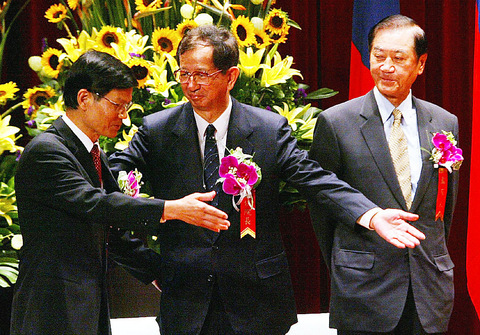Biochemist Wong Chi-huey (翁啟惠) yesterday assumed office as the ninth president of Academia Sinica, the top research institute in the country.
Wong, who was director of the institute's Genomics Research Center until Wednesday, has been recognized by world-class research institutes for his pioneering work on the elegant fusion of chemistry and biology for organic synthesis, especially of complex carbohydrates, glycoproteins and enzyme inhibitors.
Welcoming Wong as his successor, outgoing Academica Sinica president Lee Yuan-tseh (

PHOTO: CNA
Lee was a co-winner of the 1986 Nobel Prize in chemistry.
During a ceremony marking his appointment to the post, Wong spelled out four goals to help turn Academia Sinica into a research institute on a par with the world's best.
The four goals Wong put forward were: improving the institute's research environment, expediting academic exchanges between Academia Sinica and other research institutions in Taiwan and overseas, nurturing the institute's research personnel and using the institute to upgrade Taiwan's research capacity and standards.
Three other academics were also sworn in as vice presidents yesterday: Andrew Wang (王惠鈞), Liu Chao-han (劉兆漢) and Liu Tsui-jung (劉翠溶).

Taiwan is stepping up plans to create self-sufficient supply chains for combat drones and increase foreign orders from the US to counter China’s numerical superiority, a defense official said on Saturday. Commenting on condition of anonymity, the official said the nation’s armed forces are in agreement with US Admiral Samuel Paparo’s assessment that Taiwan’s military must be prepared to turn the nation’s waters into a “hellscape” for the Chinese People’s Liberation Army (PLA). Paparo, the commander of the US Indo-Pacific Command, reiterated the concept during a Congressional hearing in Washington on Wednesday. He first coined the term in a security conference last

Prosecutors today declined to say who was questioned regarding alleged forgery on petitions to recall Democratic Progressive Party (DPP) legislators, after Chinese-language media earlier reported that members of the Chinese Nationalist Party (KMT) Youth League were brought in for questioning. The Ministry of Justice Investigation Bureau confirmed that two people had been questioned, but did not disclose any further information about the ongoing investigation. KMT Youth League members Lee Hsiao-liang (李孝亮) and Liu Szu-yin (劉思吟) — who are leading the effort to recall DPP caucus chief executive Rosalia Wu (吳思瑤) and Legislator Wu Pei-yi (吳沛憶) — both posted on Facebook saying: “I

The Ministry of Economic Affairs has fined Taobao NT$1.2 million (US$36,912) for advertisements that exceed its approved business scope, requiring the Chinese e-commerce platform to make corrections in the first half of this year or its license may be revoked. Lawmakers have called for stricter enforcement of Chinese e-commerce platforms and measures to prevent China from laundering its goods through Taiwan in response to US President Donald Trump’s heavy tariffs on China. The Legislative Yuan’s Finance Committee met today to discuss policies to prevent China from dumping goods in Taiwan, inviting government agencies to report. Democratic Progressive Party Legislator Kuo Kuo-wen (郭國文) said

Sung Chien-liang (宋建樑), who led efforts to recall Democratic Progressive Party (DPP) Legislator Lee Kun-cheng (李坤城), was released on bail of NT$80,000 today amid outcry over his decision to wear a Nazi armband to questioning the night before. Sung arrived at the New Taipei District Prosecutors’ Office for questioning in a recall petition forgery case last night wearing a red armband bearing a swastika, carrying a copy of Adolf Hitler’s Mein Kampf and giving a Nazi salute. Sung left the building at 1:15am without the armband and covering the book with his coat. Lee said today that this is a serious